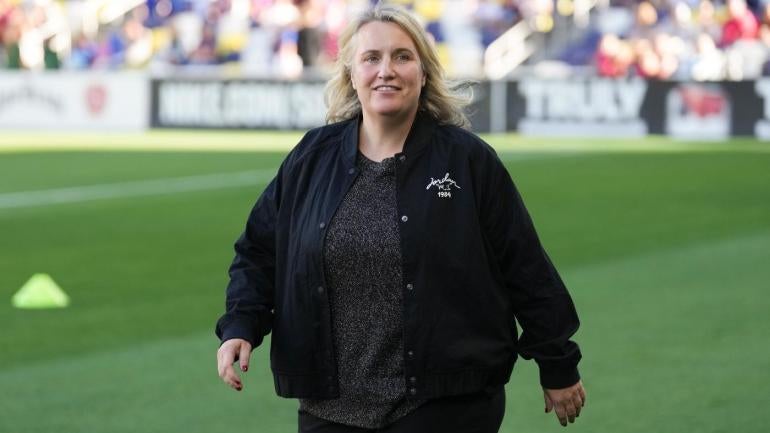
U.S. women's national team head coach Emma Hayes acknowledged the imperfections of individual accolades in team sports after winning the Women's Johan Cruyff Award at the Ballon d'Or ceremony, especially considering the glaring inequities that continue to exist in soccer.
Hayes won the coaching award on Monday for her accomplishments over the last year with both Chelsea and the USWNT. She wrapped up her 12-year spell with Chelsea by winning the Women's Super League title in May and followed it up by winning Olympic gold with the U.S. less than three months later, though she opted to thank her players and staff rather than herself.
"I think you ask any coach this question and more often than not, they would say the same things," Hayes said in a press conference on Tuesday ahead of the USWNT's friendly against Argentina. "The thing we love the most is being part of a team so the individual honors piece, for me, is the least interesting part of it. I love the team awards and winning gold medals or winning WSL championships, for me, is what gives me great satisfaction. However, we are only as good as our players and I've been fortunate enough to coach some wonderful players both at Chelsea and here with the national team … It's a huge honor for me and my family and it's a beautiful trophy and one that I'll proudly display at home."
Hayes was also complimentary of her competitors for the award including Jonatan Giraldez, who finished second after winning the UEFA Women's Champions League with Barcelona, and Arthur Elias, who ranked third after leading Brazil to the silver medal at the Olympics.
"Does Jonatan Giraldez deserve one? Yeah, he does but I think the Brazil coach deserves one because he did a tremendous job this summer," she said. "I'm not the biggest fan of [the awards] because I feel that they create more division than unity but I also understand, much like a major industry award like an Oscar or whatever, a music award, that those things have to happen."
The head coach was also quick to commend the five USWNT players who were nominated for the Ballon d'Or, which was won by Spain and Barcelona standout Aitana Bonmati for a second year running.
"I think it's been a really, really good professional year for me and one where I'm so grateful but also so proud of the players, whether it be Alyssa [Naeher], the triple espresso (Sophia Smith, Mallory Swanson, Trinity Rodman), Lindsey [Horan]. We had four players in the top 10 -- that's a great honor," she said.
However, Hayes also used the opportunity to criticize the awards for their approach to women's soccer. The head coach was unable to attend the ceremony in Paris because it was scheduled during a women's international break, a move that was also criticized by her counterpart in England, Sarina Wiegman. Hayes accepted the award in a pre-taped video message, though the complaints are not limited to scheduling. France Football, the monthly magazine that organizes the Ballon d'Or, also only awards accolades for goalkeepers, forwards and young players to men and has yet to create corresponding awards for women.
“Eleven rings symbolizing the amazing players and teams in both Chelsea and USA. I’ve been so so honored to have coached such incredible people.”
— Attacking Third (@AttackingThird) October 28, 2024
Emma Hayes wins the 2024 Johan Cruyff Award 🤩 pic.twitter.com/ghg3ErstbO
"It'd be like running an Oscars, wouldn't it, or a Golden Globe [Awards] without having any females present," Hayes said. "It just wouldn't happen and I think that, all too often, it's an afterthought, to be honest with you, and I know that there's nothing I can do to control that. If I'm honest with you, I'm happy to be with my team. I'm not really one for the glam, though I love Paris. I'm happy to be with my team, but I think for those players and coaches, it is the one industry moment they get recognized and it's disappointing but one that I did speak to the organizers about it, and they said that is something that will be changing in the future. Let's hope that is the case."
The head coach also recognized that the inequities that still exist in the sport likely make it difficult to accurately decide the winners. She criticized the fact that USWNT defender Naomi Girma was not amongst the nominees, but pointed to women's soccer's limited global footprint as a culprit. Several major women's competitions are still without notable broadcast deals in domestic and international markets, limiting audiences – and voters' – reach.
"We need to keep making it accessible, whether it be a [UEFA Women's] Champions League game versus [Liga F] in Spain or Mexico. I think accessibility is crucial," Hayes said. "I know that 50 journalists vote for it but are those 50 journalists watching women's football at the same level they're watching the men's game? Probably not, but they also might not be able to as well so I think it probably needs – it's not even a rethink -- make women's football more accessible first. That's more important."
















